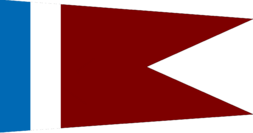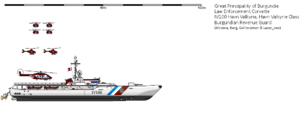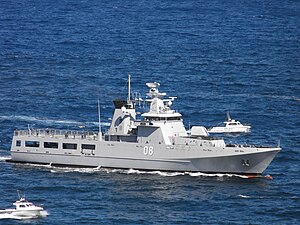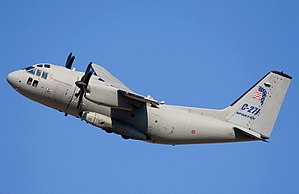Revenue Guard
| Revenue Guard Guard Revenue | |
|---|---|
 Roundel and racing stripe of the Revenue Guard | |
 Pennon of the Revenue Guard | |
| Motto | Firmitas Stability |
| Agency overview | |
| Formed | 1148 |
| Employees | 68,134 3,496 reservists |
| Volunteers | 84,736 |
| Annual budget | $8.71billion |
| Operational structure | |
| Parent agency | Ministry of Economy, Finance, and the Recovery |
| Child agency | |
Established in 1148, the Revenue Guard is an Burgoignesc law enforcement agency under the authority of the Ministry of Economy, Finance, and the Recovery's Internal Revenue Department. The Revenue Guard are a gendarmerie, but not part of Ministry of External Affair's Civil Defense and Security Department. It is responsible for dealing with piracy and other forms of maritime theft, financial crime and smuggling; it has also evolved into Burgundie's primary agency for suppressing the drugs trade. As a paramilitary corps, its 68,134 active duty officers, 3,496 reservists, and 84,736 auxiliaries maintains over 600 boats and ships and more than 100 aircraft to serve in its mission of patrolling the Burgoignesc thalattocracy and many trade routes across the world.
History
Founding and Early History
Formed in 1148 by the Triumverate Council the Revenue Guard was a royal institution commanded by a Lord Commandant who oversaw three Sergeants known as the Sergents della Maréchaussée (Sergeants of the Marshalcy), responsible for collecting taxes and arresting highwaymen, and three Captains known as the Capitaines della Guardacostes (Captains of the Coast Guard), responsible for collecting tariffs and suppressing smuggling and piracy. The revenue guard grew in size from its original 7 men to 156.
The Modern Revenue Guard
Following Burgoignesc unification in 1875, Burgundie again become a world class trading nation. The maritime capabilities of the Revenue Guard were bolstered and expanded to protect this new status. Burgoignesc shipping lanes sprung up all over the world and the Revenue Guard was tasked to protect not only ships of the Merchant Marine of Burgundie but all ships from piracy and peril. To meet this expanded mission, the Revenue Guard was granted a large coastal land tracts on Ayersee, Alcairet, Torlen, Medimeria, Equitorial Ostiecia, Sudmoll, Wintergen, and Nauta Normand to fight pirates, collect taxes, enforce maritime soverignty, and to escort trade ships. These bases turned many of these remote islands into key focal points of Burgundie which had been inwardly focused on the metropole for the last 50 years and reinvigorated the concept of the united and co-equal Burgoignesc thalattocracy. It is also the start of Burgundie taking a leading role in the enforcement of the concept of the Freedom of the seas with its harbors being considered safe harbor for all ships conducting legitimate business and the waters patrolled by the Revenue Guard as safe passage.
Organization
The Revenue Guard is organized around geographic commands which span the whole world. They are:
- Home Station Metropole (Sea of Canete, Sea of Istroya, Burgoignesc Metropole)
- Grand Station Levantine (Levantine Ocean, Sea of Nordska, and Sea of Capelan, Torlen, GrofSee (nominally))
- Grand Station of the Orient (Aab-e-Farus, Middle Sea, Sea of Kandahar, Barbary Straits, Pukhtun Sea, Salarive, Antilles, Alcairet, Chaukhira)
- Grand Station of the Odoneru (Odoneru Ocean, Tainean Sea, Kindreds Sea, St. Brendan's Strait, Songun Sea, Malentine Sea, Equitorial Ostiecia)
- Metaborealis Station (Albion Sea, Nauta Normand)
- Levantia Septentrionale Station (Kilikas Sea, Vandarch, Wintergen)
- Absurian Station (Absurian Ocean, Bay of Oduniyye, Argaea)
- Grand Station Cathay (Ocean of Cathay, Okatian Sea, Polynesian Sea, Sudmoll) (only a grand station as it used to be HQed in Ayermer and this is an honorific
- Grand Station Orxital (Sea of St. John, Sea of Orxital, Nysdra Sea, Northern Approaches, Iles Evangeline)
Each geographic command is led by an Auditor-Master (Burg:Maitre-auditeuer) and organized into Cutter Pods, Lifesaving Squadrons, Air Wings, Tax Bureaus, Financial Bureaus of Investigation, Drug Interdiction Battalions...
Special Units
International Waters Fast Action Team
Also known as Dolphin Team Whiskey, or Delta Tango Whiskey, this team has special dispensation from the League of Nations with limited legal powers in international powers, primarily search and rescue missions but of note they have the "powers to maintain a safe working environment, by the means deemed vernacularly appropriate by the team leader". In the events resulting in the loss of life, the team is required to brief the League of Nations Security Council.
Penal Service Department
Batallions Peniels (Eng. Penal Battalions) is the Burgoignesc term for its collection of military penal units, supervised by the Penal Service Department of the Revenue Guard. Soldiers and civilian criminals are given the option to be sentenced to these units, in exchange for reduced sentences, time served at 1.5 times the normal rate. Military members are stripped of their rank and redesignated as volontes reluctee (Eng. recruited volunteers). These units are divided into sindicates (Eng. labor companies), one is usually assigned to each overseas province, colony, or crownland in Burgundie and provide additional labor on large infrastructure projects. These units are held to a very strict codex de comportament (Eng. code of conduct), which if breached, extends the sentence in the Batallions Peniels considerably.
There was one recorded case of a Batallions Peniels mutiny. The Sindicate Burgundie (SiBurg), rebelled amid the civil unrest of the late 1960s but their rebellion failed and all of the members of SiBurg were executed.
During massive wildfires members of the adjoining sindicates can volunteer to be seconded to the Fire Seneschalcy of Burgundie and fight the fire. The incentive is time served at 2 times the normal rate. Ex-convicts released on good behavior and with more than 100hrs of firefighting experience are eligible to apply to the Fire Seneschalcy upon completion of their sentence, for a direct commission without having to complete general service in the Army.
Main article: Burgoignesc Maritime Navigation Administration
Auxiliaries
The Revenue Guard Auxiliaries (Burg: les Galeriens) are a force of over 80,000 volunteers from all over the Burgoignesc thalattocracy who train with and support the Revenue Guard's active duty and reserve officers to accomplish their mission. They are trained in all matters of maritime law, maritime rescue, maritime navigation, and ship handling. They can volunteer to go on Revenue Guard missions free of charge but are tasked with menial work, hence their title Galerien (Aeng: galley slave).
Revenue Guard Corps of Academics
The Revenue Guard Corps of Academics oversees the Revenue Guard Academy (an internationally accredited 4-year university), the Community College of the Revenue Guard (a nationally accredited 2-year college), the Revenue Guard Reserve Officer Training Corps (RG-ROTC), the Junior Revenue Guard Reserve Officer Training Corps (JRG-ROTC), and the Auxiliary Training Cadre.
Equipment
| Class Name | Specifications | Image | Role(s) |
|---|---|---|---|
| Training Ship Endurance |
|

|
|
| Curonia Class |
|

|
|
| Austal Class |
|

|
|
| Saint-Malo Class] |
|

|
|
| Tainean Class |
|

|
|
| Eagle Class |
|

|
|
| Kingfisher Class |
|

|
|